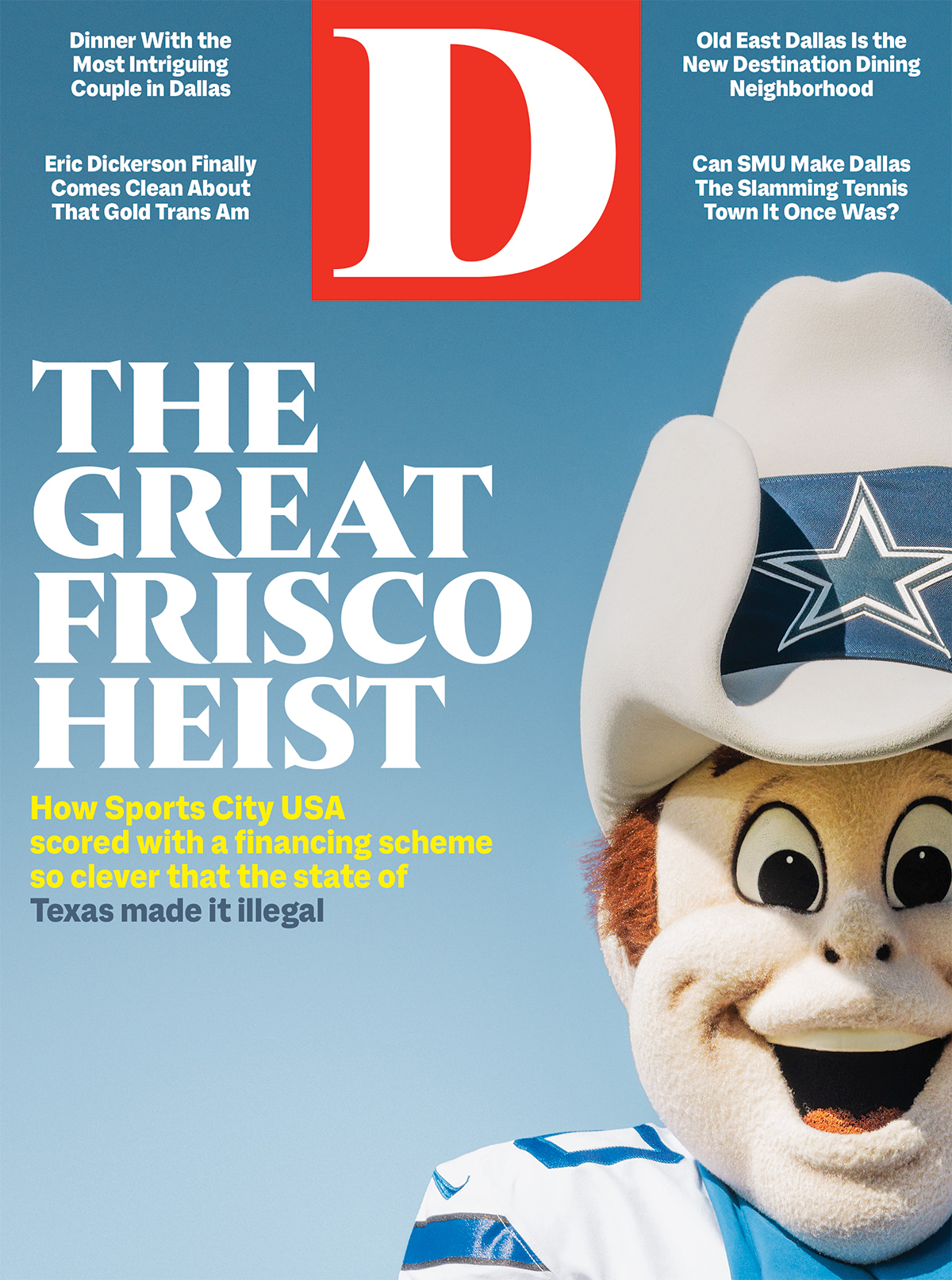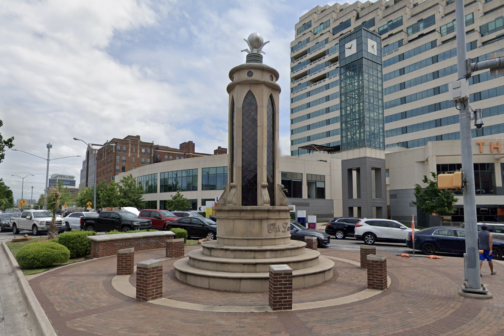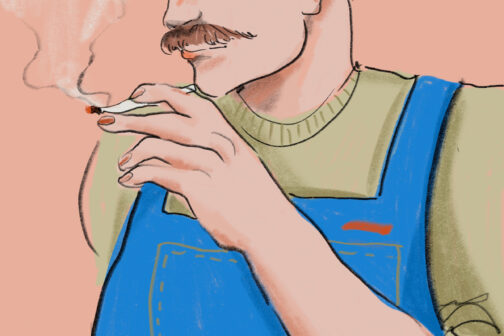About one hour and one cocktail into an evening with Abby and David McCloskey, I am made privy to a startling secret. It is not the piece of information itself that surprises me but the very fact that I am told I may not share it.
I set down my drink and interrupt: “Wait. Why can’t I write that?”
Of course, I entered the McCloskeys’ Lakewood home knowing that they could not share significant parts of their lives, seeing as Abby has advised three presidential hopefuls and David has worked for two of the world’s most secretive organizations, the CIA and the consulting firm McKinsey. David, for example, can’t tell me about his time in Syria other than he “lived there for a while” in the years before the disastrous civil war. He later talks about touring a nuclear reactor with a McKinsey client, then demurs when I ask where the plant was located; that might reveal the client’s identity. I honestly don’t even think to ask Abby for dirt on Starbucks billionaire Howard Schultz or Rick Perry, both of whom she served as a domestic policy director. That isn’t why I am here.
I am here to fill in a picture of the McCloskey pair. Tell me about a one-time CIA analyst and a Republican policy advisor with Fox News-blond highlights, and my mind can easily draw a caricature, but tell me that the analyst is currently writing spy thrillers from East Dallas coffee shops (his first novel, Damascus Station, was released by W.W. Norton in October with an endorsement from former CIA director David Petraeus, calling it “the best spy novel I have ever read”), and tell me that the Republican advisor is an economist who recently testified before the U.S. Senate Banking Committee from the corner of her bedroom on the subjects of childcare and paid parental leave, the latter of which she has championed for a decade—well, then, the cognitive pencil begs for more detail.
Just don’t ask me to explain the direction my intellectual artwork takes. “You think a CIA analyst-slash-McKinsey consultant has figured out a less miserable way to put a duvet on a comforter?” I write to my editor. Duvets, that’s the kind of intelligence I’m after.
When I arrive at the McCloskeys’ ranch-style house on an unseasonably warm Sunday evening, I am greeted by two towheaded children wearing matching pajamas and an English cream golden retriever named Lily. The McCloskey boys, ages 4 and 6, are both in Spanish language school programs. Abby is conversational in Spanish, but David’s second language is French.
“So people are able to speak in the house without me understanding,” David says.
“Which is actually very fun,” Abby says before ushering the young duo to their shared bedroom. The McCloskeys’ baby girl is already asleep; the 9 am church service always disrupts her nap schedule. At 1 year old, she can say “dada” and “mama”; no “adios” yet.
The McCloskey home looks like it was run through a trend-o-matic: white-painted brick, all-white open-concept kitchen, linen-slip-covered sofas, glass waterfall coffee table, jute rug, organic tree stump side table, bouclé club chair—a completely neutral palette save for a faux fiddle leaf fig and a few colorful books among the neat horizontal stacks on a built-in. The word “Kissinger” pops in bold red letters on the spine of one. Abby has no posts on Instagram but maintains an account to follow her favorite interior designers.
The McCloskeys are dressed neutrally as well. David in a white long-sleeve tee, dark jeans, and gray sneakers. Abby in all black: a button-down tucked in, revealing a slim frame in leggings, and mules with a metal buckle. They both are tall, are in their mid-30s, and possess the kind of all-American good looks that get bad actors cast in Hallmark Channel originals.
David breaks from a bowl of pasta dough to make Old Fashioneds, each garnished with an Amarena Fabbri cherry and a single Rubik’s Cube-size block of ice. “You won’t hurt my feelings if it’s too strong,” he says, placing the drink in front of me. If there is any doubt that the McCloskeys are people who go all in on any given task (in this case, setting a scene for a magazine article), the spread before me is proof. I risk disrupting the charcuterie board presentation to pick a square of their homemade focaccia and a scoop of balsamic-drizzled whipped ricotta. Water is served in a carafe. Candles will soon be lit. David lifts the lid of a sauté pan on the kitchen island stove-top opposite my perch and stirs the Bolognese, which required four hours of chopping and simmering the previous day.
“Have you ever made lasagna from scratch before?” Abby asks. “Unfortunately it might just take a few hours to make.” While David displays an unwavering earnestness, Abby shows a streak of convivial sarcasm not apparent in her data-driven op-eds for the Dallas Morning News and Politico. “We also have lamb if it all goes awry.”
There is a purpose to this particular menu. Tonight we will be tasting the “greatest hits” from a formative time in the McCloskeys’ lives. The chain of life-shifting events started in the fall of 2018, just after David had made associate partner at McKinsey. The consulting grind demanded 15 hours a day, up to 80 hours a week, often out of town. If his project was local, he might have 15 minutes for a glass of wine with Abby at the end of the day before returning to his computer. Not long after David’s promotion, however, Abby got an offer she didn’t want to refuse. Eight weeks after the birth of their second child, she started flying up to Seattle, “pumping in Ubers and all of that,” to deliver policy presentations to Schultz, whose disdain for political polarization drove him toward a 2020 run as an independent. It became clear that a full-time position was hers for the taking, but it would require a weekly commute to the Pacific Northwest. So they agreed: it was time for David’s career to take a spin in the back seat.
He put in for a six-month leave of absence during which time he planned to do three things: one, get back in shape after years of anatomical deterioration at the edge of his desk. Two, work through a few Italian cookbooks. And three, dust off a 100,000-word manuscript that had been idling in the recesses of his laptop for four years. “Kind of a random list,” he admits. David kept to it. He got up at 5 am for CrossFit workouts. He followed Marcella Hazan down the rabbit hole through Essentials of Classic Italian Cooking. The old novel, however, turned out to be “unsalable” in David’s estimation. He had written it during a three-month gap between leaving the CIA and starting at McKinsey, not with publication in mind but as an act of processing the Syrian conflict that had consumed his tenure at the Agency. The plot was thin if nonexistent, David realized. He kept the outlines of a couple of characters, trashed the remainder, and started anew with a blank Word doc.
The result is something that might be accomplished only by someone who spent years inside Langley: an authentic portrayal of espionage tradecraft. In contrast to the martini-sipping glamourpuss spies of yore, David’s CIA case officer is a Coors-swigging Midwesterner wrestling with potentially career-ending feelings for a beautiful Syrian palace official who might be the key instrument in helping him avenge a colleague’s demise. Tradecraft, by the way, is something you will become intimately familiar with in reading Damascus Station, even if you are, like me, a 40-year-old spy thriller virgin. I’m certain I now have enough knowledge to successfully complete a dead drop or SDR (surveillance detection route). I can spout random CIA trivia, such as the existence of a hot dog vending machine in the Langley basement, and speak on the “bipolar nature” of an agency that has the “ability to find and kill a person in the Hindu Kush” but also has a frustrating lack of staplers.
In addition to the blinding praise from Petraeus, former Navy SEAL and bestselling author Jack Carr offered the following book jacket blurb: “I am shocked the CIA’s Publication Review Board allowed David McCloskey’s Damascus Station to see the light of day. Read it now before it is banned!” (In truth, David was careful not to betray any state secrets. He delivered the manuscript to the review board with almost 300 footnotes pointing to sources on the public record, WikiLeaks not included.) The thriller has so far earned 4.39 stars on Goodreads, more than anything by John le Carré, the gold standard in spy fiction and David’s favorite author. David serves action and romance in equal measure, and since it was top of mind as he wrote, Italian cuisine makes several cameos.
“You want to get it super thin,” David says while checking the notes in the recipe book. After a brief fumble with a pasta roller, he starts feeding a strip of dough through the machinery. “You have to admit that’s not terrible for the first time of the year,” he says, holding up a floppy sheet. He made about 10 lasagnas during his sabbatical, but their last spin with the pasta roller was Christmas of 2020 with Abby’s sister, their only family member in the city.
The McCloskeys came to Dallas by way of McKinsey. They were heading into their 30s and thinking of kids but didn’t want to raise a family in D.C. David hadn’t worked in the private sector since he was a teen manning the cash register at Wendy’s. Abby was burned out by simultaneously working through grad school and hitting the glass ceiling at a center-right economic think tank.
“To rise up in a lot of think tank institutions, you have to be an old guy who served in the administration at some point,” Abby says, “and there wasn’t a lot of space for a woman with a master’s degree in econ. I think I was just tired of fighting that fight.”
I must pause to note that this is the point in the evening I became the bearer of a secret, the only piece of information in a four-hour visit that is disclosed in confidence.
“Don’t put this in the story, but—” Abby proceeds to divulge.
Weeks later, I would convince Abby to declassify the information. So here it is: when the McCloskeys were moving to Dallas, Abby planned to take a break from work and spend some time lying around a pool.
Eight weeks after the birth of their second child, Abby started flying up to Seattle, “pumping in Ubers and all of that,” to deliver policy presentations to Howard Schultz.
I can only conclude that what separates true overachievers from the multitudes is the level of shame one feels when admitting to the completely normal human desire to do nothing all day but wear a kimono. What’s especially ironic about Abby’s inclination to shield her idle fantasy is that she never even got close to planting a bikini bottom near any cabana. Instead, what happened was that on the move from D.C. to Dallas, Abby’s phone rang, and on the other end was the campaign manager for Rick Perry, governor of Texas. Perry had been told his first presidential bid was weak on domestic policy, and his team had gotten Abby’s name from folks at the think tank. She was to meet Perry at a fundraiser at a fancy house in the Park Cities. The McCloskeys rolled into Dallas in the fall of 2014—coinciding with the arrival of Ebola. Instead of meeting the governor at a glittery soirée, Abby scrambled to find a suit packed away in garment boxes and drove to Texas Health Presbyterian Hospital.
She walked in on a backroom conversation between the governor, Dallas Mayor Mike Rawlings, a team of doctors, and school officials trying to track down Patient Zero’s children, moments before a press conference. Afterward, Abby flew with Perry on a private plane back to Austin where she was finally able to discuss a potential role. A few days after clinching the gig, Abby found out she was pregnant. She was 39 weeks along when Perry announced his second run, which made a splash on the news as the June event was held in an Addison airport hangar with no air conditioning and the entire crowd was sweating profusely. A pool might have been nice.
It seems my proficiency in ringing out fresh lasagna noodles “like lingerie,” as the recipe dictates, is wanting, and David swoops in to my right to dry the soggy pasta on a patchwork of tea towels lest it all start sticking together. Behind us, Abby boils three strips at a time and then swiftly passes them in a mesh strainer, water sploshing on the wood floor. She throws a towel down and pushes it with her foot. We laugh at the glorious mess. If I were not a third wheel and the McCloskeys were not a dozen years married, the scene would fizz with rom-com energy.
After Abby pops the lasagna in the oven and David starts on the lamb chops, I ask for their romantic origin story, and I can’t help but feel a mild pang when I realize my own path to wedded bliss can be summed up in five generic words (“met through a mutual friend”) while theirs is like a poetic strand of marital DNA that only the McCloskeys would carry, five of their words being “comparative economic systems,” “Anglican,” and “Koch” (as in the family dynasty).
As the story goes: David McCloskey of the Minneapolis suburbs and Abigail Martin of an Ohio cottage town on the southern shore of Lake Erie first crossed paths on the campus of Wheaton College, a small Christian university outside Chicago, a school so conservative that it made national news in 2003 when the administration hosted its first on-campus dance. Abby transferred in after spending a freshman year at Vanderbilt as a Tri Delt evading invitations to party. “I was nerdy,” she says. “I wanted to study.”
Abby and David exchanged a few words when they sat next to each other in Comparative Economic Systems, “an outrageously wonderful class,” Abby says. They also attended the same Anglican church throughout college. But they didn’t get to know each other until the summer before senior year when both interned in Washington, D.C. It was David’s second summer with the CIA. Abby was working for the Koch Foundation. A group outing fell apart, and they were left as a party of two. “I remember being extremely excited that it was turning out that way,” David says. The pair got sushi in Dupont Circle and then walked the city streets for eight hours, lost in conversation. Within three weeks, Abby confessed to her journal: she was going to marry David. “It didn’t even make any sense,” Abby says. “You’re just part of this stream that was already flowing.”
The time reads a reasonable 8:43 pm when the lasagna and lamb are ready. We take our seats around the dining table, and David fills our goblets with a sangiovese from a region where he and Abby have vacationed on several occasions. I ask the McCloskeys what they did for fun in college considering they lived on a dry campus. Abby remembers mostly sipping tea indoors, Chicago weather and all. But as dinner wears on, a couple of stories tumble out that suggest David didn’t always button his dress shirts to the top.
One involves his first polygraph for the CIA at the ripe age of 19. The notoriously thorough personality screening caused one of his friends to suffer a mental break. When David was in the hot seat, the examiner caught something odd on the subject of property destruction and asked for more information. “So I started listing out all these pranks I’d done. We threw a shopping cart off the roof, or like, we took the American flag down and put a pirate flag up. I can kind of tell that he was smirking inside at least, and he lets me go on for a while,” David says. “We threw a giant door off the building, we threw a TV off the building, broke a window with a water balloon launcher. He was more than happy to listen to the full litany of me admitting to every college prank that I’d ever done.” The lack of keggers, it seems, only leads to other forms of mischief, none of which worried the CIA.
But hurling large objects wasn’t his only collegiate caper. David honed his writing chops as the co-founder of a satirical campus publication, “a Christian version of The Onion,” as he describes it. “I submitted a piece once,” Abby pipes in. “It was rejected.”

“This comes up every two months,” says David, keeping his eyes on his lamb chop.
“It wasn’t that funny apparently,” Abby says. “That’s when I decided I would stick to nonfiction.” She uses her fork to punctuate the sentence.
The McCloskey partnership seems to have moved past Abby’s resentment and extends beyond domestic bounds. During dinner, I see a small insect flutter above the candlelight and realize the French doors are swung open to reveal flames dancing in a concrete vessel on the patio. “A lot of the plot of Damascus Station was worked out at that fire pit,” David says. The couple doesn’t watch much TV after the kids go to bed. “It just doesn’t put as much energy back in my tank,” he says. David usually buries his nose in a spy thriller, and Abby reads essays in something heady like The Atlantic. The exception to this routine is when David is actively writing a novel. They will take gin and tonics outside and parse through storylines and characters. “It’s very hard for me to process things unless I talk about them out loud,” David says. After every five or so chapters, he’ll print pages for Abby’s review. The same goes for her op-eds. Abby has some economist colleagues with whom she confers, “but at the end of the day the person I run everything by is David,” she says.
Marcella Hazan’s “Chimney Sweep’s Gelato” calls for six egg yolks and an orange peel. Topped with Houndstooth espresso grounds and bourbon, the dessert has a flavor my palate has never quite experienced. I take a couple more bites while pushing away from the table. We carry our glasses outside to the Adirondack chairs, and in the spirit of the fire pit, our conversation explores new depths.
David speaks thoughtfully about his six years covering Syria. He compares his work as a CIA analyst to that of a journalist, only in the case of intelligence briefs, his sources were satellite images and intel stolen from foreign entities by U.S. operatives. The writing was dry, but it gave him a bird’s-eye view of the tectonic shifts among international powers and, at the same time, the opportunity to watch adversaries with a magnifying glass. He studied their histories and motivations, witnessed the vicious and the mundane. He came to know them as human.
“I think as an analyst, you’re spending so much time thinking about the world from that country’s standpoint, you start to build up some comfort or skill set thinking from someone else’s angle,” David says. “That’s helpful in character development because, you know, my characters in the book do things that are morally reprehensible, but you still have to understand why they’re doing it and be able to empathize in some way with the way they see the world.” He’s not one for cartoon villains. “I don’t know people in my normal life who are all good or all bad; they’re all shades of gray,” he says. “It felt more realistic to have ambiguity take over and see the story go from there.”
Navigating the complexities of humankind comes up again when the conversation turns to the fractured state of Washington, D.C. By all appearances, Abby is not a political animal; she is a scientist focused on policy, processing economic data to reach solutions. This means her conclusions don’t always fall cleanly within party lines. “It doesn’t make sense that one side would have the monopoly on all the good ideas,” she says.
David compares his work as a CIA analyst to that of a journalist, only in the case of intelligence briefs, his sources were satellite images and intel stolen from foreign entities.
Abby started studying the benefits of paid parental leave a decade ago. Her counterparts at liberal think tanks had taken up the issue, but these were the Tea Party days, and little came of her work. “I wouldn’t say it was received very well. It wasn’t really received at all. It kind of seemed like a RINO thing,” she says, using the acronym for the pejorative term “Republican In Name Only.” The tide began to turn when Ivanka Trump took an interest, and Abby had extensive conversations with the Trump administration about her proposal. Her hope is for American parents, mothers and fathers, to get a guaranteed two to three months at home with their newborns without fear of financial instability. “It’s hard for me to think of who would qualify for a basic safety-net level of government protection other than an infant,” Abby says. She worries about the increasing dearth of moderates in D.C. but has no plans to return. The McCloskeys have built a community in Dallas, mostly stemming from their Anglican church, located downtown.
David left his job at McKinsey in early summer and now writes fiction from coffee shops full time. By the time this story is printed, he expects to have a contract inked for his next book, this one revolving around the spy war between the United States and Russia. His book editor begged him off writing a sequel to Damascus Station straightaway in case the first didn’t sell, but so far he’s moving about 1,000 copies a week, a decent clip for a first-time author. He’s also in talks with two parties interested in acquiring the rights to turn the book into a TV series. This gives David hope that he just might be able to feed a family off novel-writing, but he’s aware there aren’t too many people able to accomplish such a feat.
“The worst-case scenario, it doesn’t catch and I’ll go find some normal job. That would be just fine.” He takes a breath. “The upside’s exciting.”
“The upside is super exciting,” Abby says. She’s curled up in the chair, a sip of wine remaining.
As dinner parties go, the conversation winds and skips to inexplicable places before getting tugged back to earth. Sometime late in the evening, I hear myself telling my dog’s imagined backstory, in which my dog tap dances on Lake Charles riverboats to earn kibble for his siblings. The sprinklers go off in the middle of David’s impassioned treatise on realism in modern spy fiction, and he completes his thoughts standing up as the zone cycle gets dangerously near our chairs. I learn about the praying mantis living in a terrarium in their bathroom, on the verge of death having recently produced a sac containing 400 eggs. I find out the backdrop of espionage books David uses for media spots is not in an office but the kids’ playroom. We talk about our babies’ sleep habits. Abby and I compare notes on the glamour of working motherhood. I wonder, if a satellite were spying from the blistering darkness of the thermosphere, it just might see three freelancers trying to make their way in the world, getting wine-tired on a Sunday night, realizing they have to get kids ready for school in the not-too-distant future.
I completely forget about my planned duvet interrogation. Though I call later for the answer I could already guess. “It’s a very unpleasant task and very hard to do on your own,” David says of duvet-cover-putting-on. “I’ve tried, and Abby will come in, and it looks like a bunch of raccoons snuggled into it.”
Confirmation that we are all only human, even the McCloskeys.
Get the D Brief Newsletter
Author








